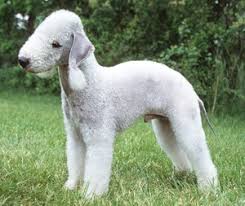
Bedlington Terrier
Conditions of detention
Bedlington Terriers are adaptable and can thrive in both urban and rural environments. They do well in homes with access to a yard or nearby parks where they can exercise.
Useful Fact: They require regular physical and mental stimulation, so daily walks and playtime are essential to keep them happy and healthy.
Nutrition and diet
A balanced diet with high-quality dog food that includes proteins, fats, and carbohydrates is crucial for Bedlington Terriers. Fresh meat, vegetables, and grains can supplement their diet.
Useful Fact: Monitoring their weight is important as Bedlington Terriers can be prone to copper toxicosis, a genetic liver disease, so a diet low in copper may be recommended by a vet.
Health
Bedlington Terriers are generally healthy but can be prone to specific health issues such as copper toxicosis, hip dysplasia, and eye problems. Regular veterinary check-ups are crucial.
Useful Fact: Regular blood tests can help detect copper toxicosis early, allowing for timely management of the condition.
Grooming and care
The Bedlington Terrier has a unique, curly coat that requires regular grooming to prevent matting and tangling. Professional grooming every 6-8 weeks, along with regular brushing, is recommended.
Useful Fact: Their coat is hypoallergenic, making them a good choice for people with allergies.
Education and training
Bedlington Terriers are intelligent and eager to please, making them relatively easy to train. Early socialization and consistent, positive reinforcement training methods are crucial.
Useful Fact: They respond well to training that includes a variety of activities and challenges, keeping them mentally stimulated.
Toys and entertainment
Interactive toys, puzzle games, and activities that involve hunting and fetching are excellent for keeping a Bedlington Terrier mentally and physically stimulated.
Useful Fact: They enjoy tasks that challenge their problem-solving abilities and mimic their natural hunting instincts.
Safety
A secure, fenced yard is important for Bedlington Terriers to prevent them from wandering off while exploring. Supervision during outdoor activities is recommended.
Useful Fact: Their agile and curious nature means they can be escape artists, so ensuring your yard is secure is crucial.
Accessories
Sturdy collars and leashes, comfortable bedding, grooming tools, and interactive toys are essential accessories for a Bedlington Terrier. Crate training can also be beneficial for travel and safety.
Useful Fact: Reflective gear enhances safety during evening or early morning walks, making them more visible to others.
Socialization
Early and ongoing socialization with other dogs, animals, and people is important for Bedlington Terriers. It helps them develop a well-rounded temperament.
Useful Fact: Regular socialization helps prevent shyness or aggression and ensures they are friendly and adaptable in various situations.
Travel and Transportation
Bedlington Terriers can adapt to travel if introduced gradually. Secure crates or harnesses in vehicles ensure their safety during trips.
Useful Fact: Bringing familiar items, such as their favorite blanket or toy, can help reduce travel anxiety and make them more comfortable.
Behavior and psychology
Bedlington Terriers are known for their affectionate, playful, and intelligent nature. They require regular mental and physical stimulation to prevent boredom and destructive behavior.
Useful Fact: Their loyal and close bond with their family makes them excellent companions, but they can exhibit some independence and a strong prey drive due to their hunting background.
Legal aspects
Owners should be aware of local regulations regarding pet ownership, including licensing, leash laws, and specific breed regulations.
Useful Fact: Keeping vaccination records and adhering to local pet laws ensures the safety and legality of owning a Bedlington Terrier.


